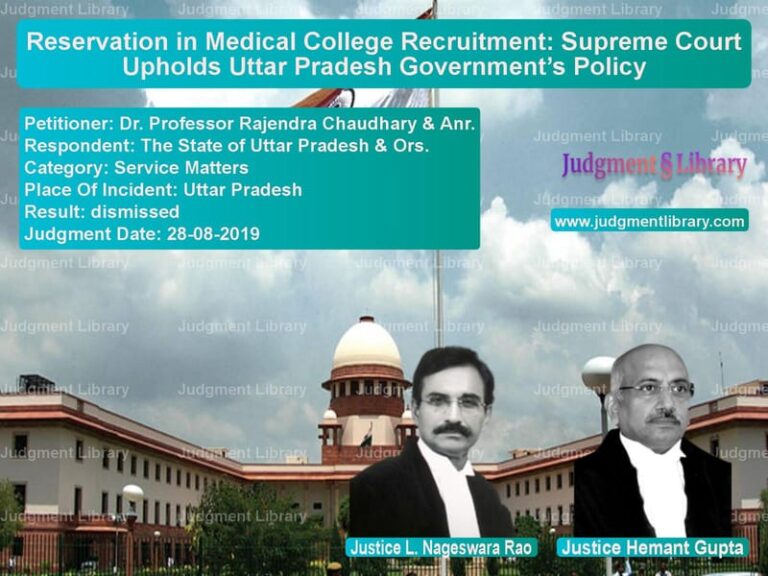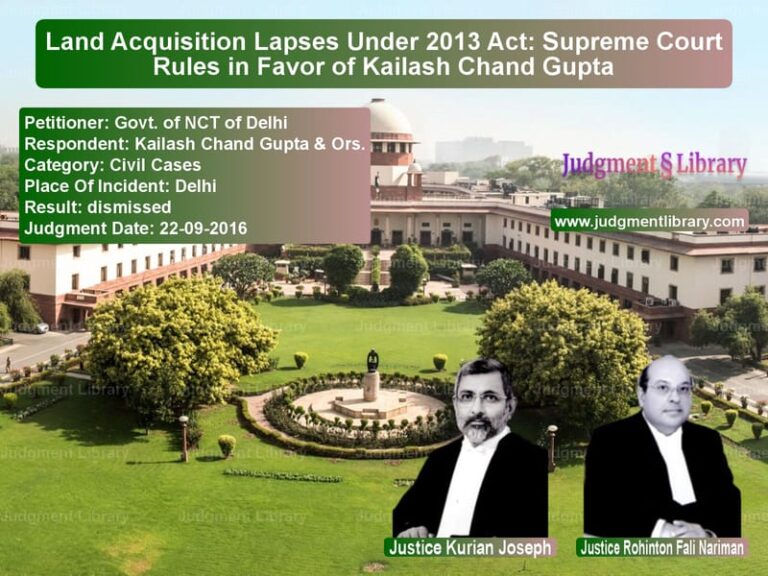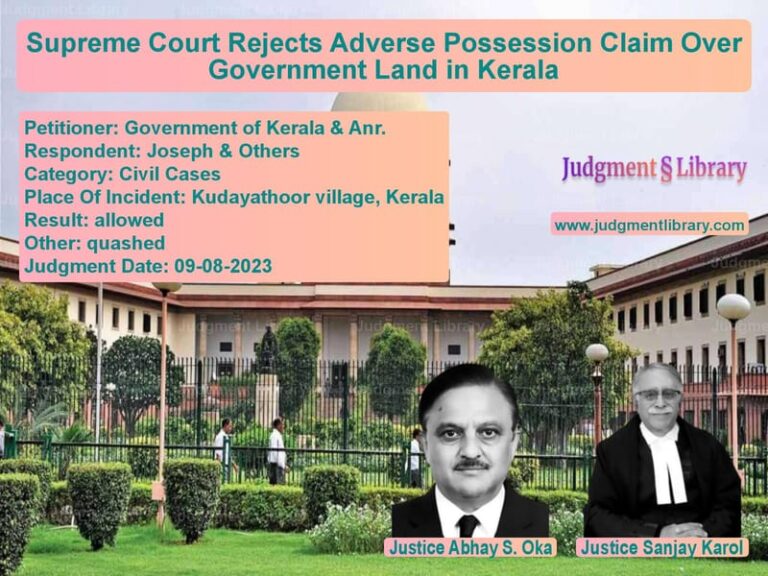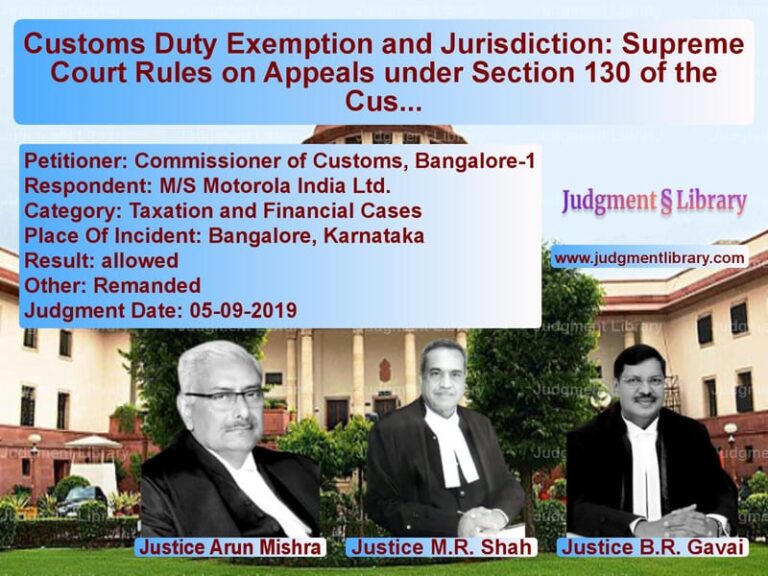Supreme Court Overturns Death Sentence in Bihar Rape and Murder Case, Orders Reconsideration
The Supreme Court of India has set aside the death sentence imposed on Munna Pandey in a case involving the rape and murder of a 10-year-old girl in Bihar. The Court found serious lapses in the investigation and trial, highlighting that crucial contradictions in witness statements were overlooked, forensic evidence was ignored, and the accused’s medical examination was not conducted. As a result, the case has been remitted back to the Patna High Court for reconsideration.
Background of the Case
The case revolves around the tragic incident that occurred on 31 May 2015, in Sabour, Bihar. The victim, a 10-year-old girl, was reported missing after going to watch television at a neighbor’s house. Her mother, Kiran Devi, was informed by her elder daughter Priya Kumari that the child had not returned home. Upon searching, villagers found her body concealed beneath a bed in a locked room belonging to the accused, Munna Pandey.
The prosecution alleged that the accused, along with co-accused Pritam Tiwary, lured the child into the house, raped her, and then murdered her. Based on circumstantial evidence, the trial court convicted Pandey under Sections 302 and 376 of the Indian Penal Code (IPC) and Section 4 of the Protection of Children from Sexual Offences (POCSO) Act. He was sentenced to death, which was subsequently confirmed by the Patna High Court.
Defense Arguments
The defense, led by Senior Advocate Dr. Aditya Sondhi, challenged the conviction, arguing that the case was purely circumstantial and lacked conclusive evidence. The key arguments raised included:
- Flawed Circumstantial Evidence: The prosecution’s case was based entirely on circumstantial evidence, which did not form an unbroken chain leading to guilt beyond reasonable doubt.
- Failure to Conduct Medical Examination: The accused was not subjected to a medical examination under Section 53A of the CrPC, a critical lapse in rape cases.
- Forensic Evidence Ignored: The prosecution failed to present forensic reports of the victim’s vaginal swab, the accused’s underwear, or other crucial evidence.
- Contradictions in Witness Statements: Initially, all witnesses stated that the victim was last seen with co-accused Pritam Tiwary. However, during the trial, the narrative shifted to implicate Munna Pandey.
- Unreliable Last Seen Evidence: The only “last seen” witness was the victim’s elder sister, a minor, whose testimony contained material inconsistencies.
Prosecution’s Arguments
The prosecution maintained that:
- The victim was last seen with the accused at his house.
- Her body was found in his room, locked from the outside.
- The accused gave false information about the victim’s whereabouts.
- The accused did not cooperate with villagers searching for the girl.
Supreme Court’s Key Observations
The Supreme Court, led by Justices B.R. Gavai, J.B. Pardiwala, and Prashant Kumar Mishra, found multiple issues with the trial proceedings:
1. Flawed Investigation
The Court noted that the investigating officer failed to obtain forensic evidence, despite a letter being filed to send exhibits for forensic examination. It stated:
“The investigating officer in her cross-examination admitted that following instructions of senior officers, she did not take steps to procure the FSL report.”
2. Failure to Conduct Medical Examination
The Court stressed that in rape-murder cases, medical examination of the accused is crucial. It cited the Chotkau v. State of Uttar Pradesh case, emphasizing:
“Medical evidence assumes great importance when the victim is dead, and failure to produce such evidence creates a gaping hole in the prosecution’s case.”
3. Contradictory Witness Statements
Examining police records, the Court found that witnesses had initially stated that co-accused Pritam Tiwary took the victim to his house. However, during the trial, the same witnesses shifted their stance to implicate Munna Pandey.
The Court remarked:
“Neither the defense counsel, the public prosecutor, nor the trial court noticed this glaring contradiction.”
4. Failure of the Trial Court and High Court
The Supreme Court strongly criticized the lower courts for not applying their judicial mind to these issues. It stated:
“The High Court should have exercised its powers under Sections 367 and 368 of the CrPC to direct further inquiry or seek additional evidence.”
Verdict: Case Remitted for Reconsideration
The Supreme Court set aside the Patna High Court’s judgment and remitted the case back for fresh consideration. It directed the High Court to:
- Re-examine the contradictions in witness statements.
- Assess the absence of medical and forensic evidence.
- Ensure the accused’s right to fair trial is upheld.
Significance of the Judgment
This ruling underscores the importance of fair trial principles, particularly in death penalty cases. The Supreme Court reaffirmed that:
- Courts must actively scrutinize evidence rather than act as passive spectators.
- Judges have a duty under Section 165 of the Evidence Act to elicit truth.
- Death penalty cases require heightened judicial scrutiny.
Conclusion
The Supreme Court’s decision serves as a crucial reminder that capital punishment cases demand the highest degree of procedural fairness. The ruling not only provides relief to the accused but also reinforces the principle that justice must be based on irrefutable evidence, not procedural lapses or investigative failures.
Petitioner Name: Munna Pandey.Respondent Name: State of Bihar.Judgment By: Justice B.R. Gavai, Justice J.B. Pardiwala, Justice Prashant Kumar Mishra.Place Of Incident: Sabour, Bihar.Judgment Date: 04-09-2023.
Don’t miss out on the full details! Download the complete judgment in PDF format below and gain valuable insights instantly!
Download Judgment: munna-pandey-vs-state-of-bihar-supreme-court-of-india-judgment-dated-04-09-2023.pdf
Directly Download Judgment: Directly download this Judgment
See all petitions in Murder Cases
See all petitions in Rape Cases
See all petitions in Custodial Deaths and Police Misconduct
See all petitions in Judgment by B R Gavai
See all petitions in Judgment by J.B. Pardiwala
See all petitions in Judgment by Prashant Kumar Mishra
See all petitions in Remanded
See all petitions in supreme court of India judgments September 2023
See all petitions in 2023 judgments
See all posts in Criminal Cases Category
See all allowed petitions in Criminal Cases Category
See all Dismissed petitions in Criminal Cases Category
See all partially allowed petitions in Criminal Cases Category







